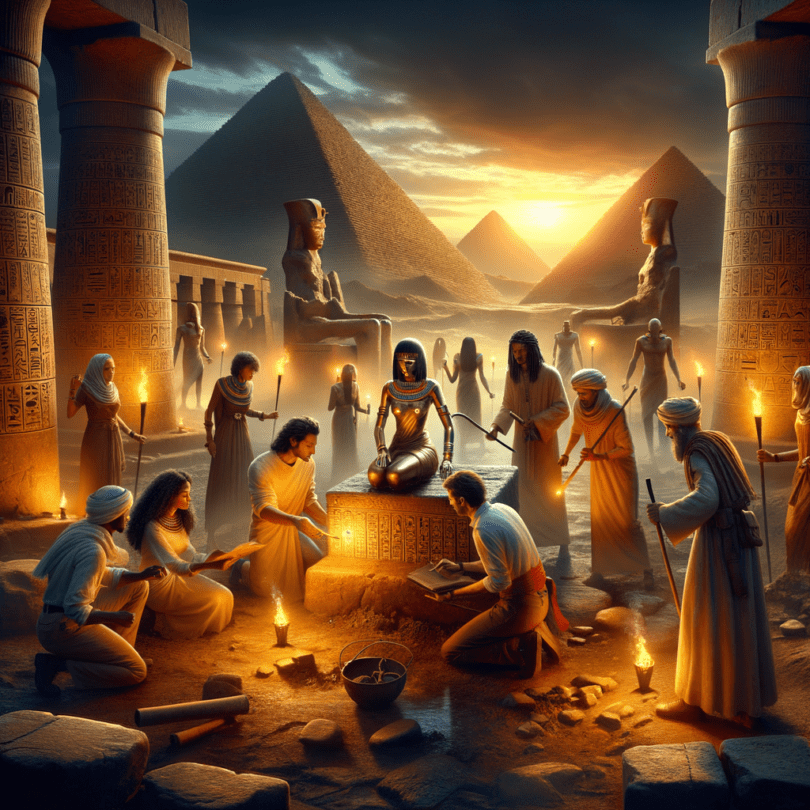When I first stumbled upon Cleopatra VII’s story, it’s like I fell down a rabbit hole—this isn’t just any rabbit hole, mind you, but one filled with beauty, wisdom, and heaps of enigma! As the last ruler of Egypt’s Ptolemaic dynasty, Cleopatra’s life is like a treasure trove of mystery wrapped in political intrigue. Historians and curious folks like myself have been trying to unravel the complexities of her existence for centuries, with much of her life like an unfinished puzzle begging to be completed. It’s this cocktail of fact and lore that just keeps pulling me back in, like a moth to an ever-glowing flame.
The Enigma of Cleopatra’s Background
Talk about a brain teaser! Cleopatra’s roots trace back to 69 BCE, deeply nested within the Ptolemaic dynasty—a Macedonian Greek famiglia, if you will, that had their hands on Egypt since the times of the great conqueror, Alexander. But here’s the juicy bit that gets my mind racing: Could her mother or grandmother have been Egyptian? The whispers of this possibility have fluttered through time, with bits of history more like patchy Swiss cheese than a solid loaf. Imagine trying to solve a crossword puzzle where someone has erased half the clues! It tickles the historian in me to think about Cleopatra straddling her Greek heritage and her life in Egypt. She was the first in her line to speak Egyptian. Was she merely being politically savvy, a savvy bridge-builder between worlds, or was there something even deeper there?
Historical Records: Gaps and Biases
Now here comes the head-scratcher: historical records. I mean, most of what we know about Cleopatra we owe to the Romans—folks like Plutarch and Cassius Dio. But let’s be honest, these were no untainted narrators. They wrote Cleopatra’s story years after her epic life ended, with their pens dipped not in ink, but in heaps of Roman propaganda. Every time I dive into these ancient accounts, it’s like wading through a sea of ‘truth’ mixed with a bit of dramatic flair. Was Cleopatra truly the crafty seductress they paint or more a victim of a scandalous smear campaign?
Cleopatra’s Image: Fact or Fabrication?
Ah, Cleopatra’s beauty—now that’s the conversation starter. Was she the ultimate beauty queen that legends suggest or did her true magic lie in wit and charm? Coins and busts from her era hint at a woman whose looks defy modern beauty norms. Yet, when I look at these treasures, I don’t see a conventional beauty; I envision a sharp mind and a skilled conversationalist, someone whose mere presence could sway the most stubborn of political titans. I find it fascinating, really, how our definition of beauty shifts with time and context.
The Politics of Power and Perception
Let’s give credit where credit is due—Cleopatra was a powerhouse, reigning in a time when women in power were rare as hen’s teeth. She wasn’t just playing bit parts in Roman rom-coms; she was the headline act. Why is it that her political prowess often takes a backseat to her love life in history’s retelling? Could it be that her gender and the power dynamics of her era buried her real story deep within history’s folds? It makes me wonder, makes me sad, and makes me rally for the untold stories out there.
The Search for Cleopatra’s Tomb
Ah, the case of her lost tomb—a classic unsolved mystery! Cleopatra’s final resting place, supposedly shared with Mark Antony, is like Egypt’s best-kept secret. Despite fervent archaeological quests, no one has managed to uncover it—yet! Each new expedition is a roller coaster of excitement and anticipation for me, raising a flicker of hope that maybe, just maybe, we’ll strike gold. What treasures, tales, and truths lie in wait? Will unearthing her tomb finally add those missing pieces to her life puzzle, or just scatter more breadcrumbs for us to follow?
Modern Interpretations and Influences
Her story, as grand as any old myth or modern movie script, keeps getting retold—books, plays, even binge-worthy Netflix series have all dipped their toes in Cleopatra’s story pool. It’s like each new take on her life adds another stroke to a never-finished canvas. I love consuming these narratives, though I can’t help but wonder how they shape our collective view of Cleopatra. Blurring fact with fiction, these creative retellings breathe life into her ancient world for us dreamers of today.
Conclusion: Embracing the Mystery
Honestly, while my mind yearns for answers, I’m quite fond of Cleopatra the Mystery. The blanks in her history allow for infinite “what ifs” and “maybes,” making way for imagination to waltz around like nobody’s watching. To me, Cleopatra’s tale isn’t just about piecing together the truth, but celebrating the complex dance between legend and history. She’s a testament to the fascinating interplay of identity, power, and mythology, a constant reminder that some mysteries are better left alive, stoking the fires of human curiosity.

